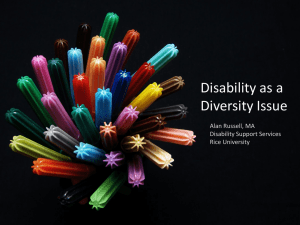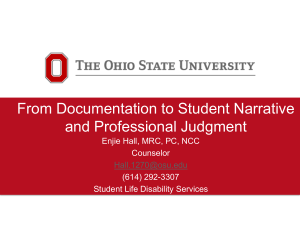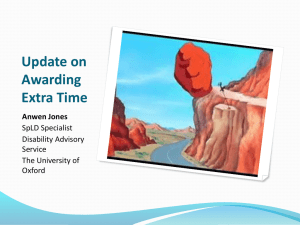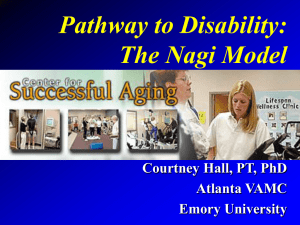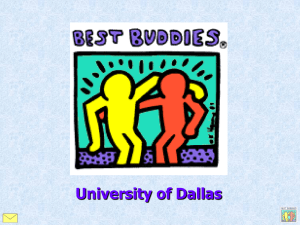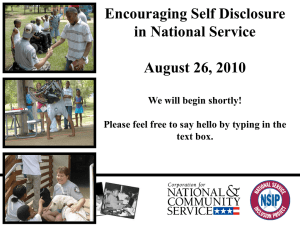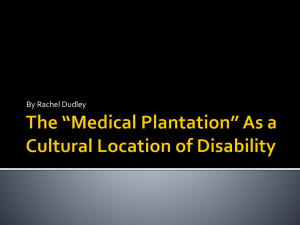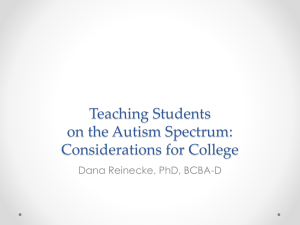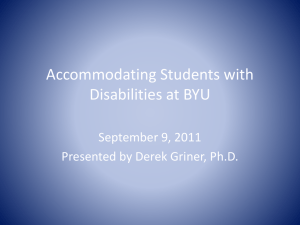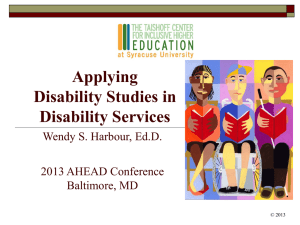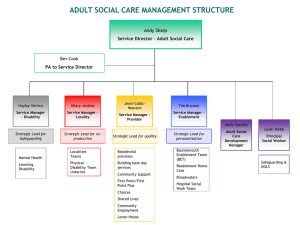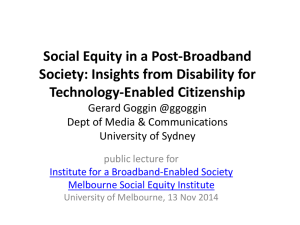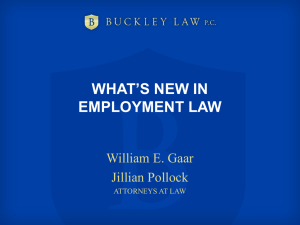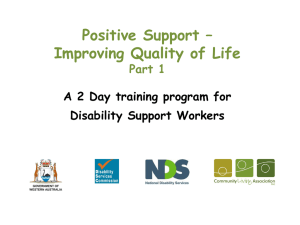Sarah Niblock Fri 1100
advertisement
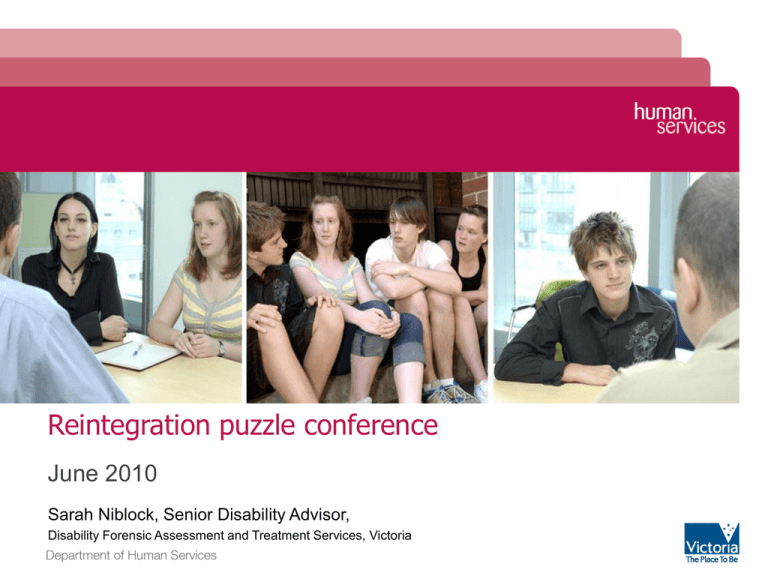
Image zone Reintegration puzzle conference June 2010 Sarah Niblock, Senior Disability Advisor, Disability Forensic Assessment and Treatment Services, Victoria Young People With a Disability in the Victorian Youth Justice System: Ensuring a Collaborative Approach Reintegration Puzzle Conference 2010 Sarah Niblock 24 June 2010 Senior Disability Adviser (SDA) – : a Collaboration • Aims: to build capacity of youth justice and disability client services staff to effectively respond to the needs of young people with a disability involved in the youth justice system with a focus on youth justice custodial facilities. • Also focuses on strengthening and supporting collaboration between Disability Services and Youth Justice throughout the case management process. • Funded by Disability Services and Youth Justice (Victoria) • State-wide role and ongoing since 2008 Governance • Client Group is all young people involved with the youth justice system in Victoria who have a registered disability • Works with a variety of agencies • Works at Parkville Youth Justice Precinct and Malmsbury Youth Justice Centre • Based at and managed by the Disability Forensic Assessment Treatment Service (DFATS) • Reports to a high level of departmental interface committee • Contributes to broader disability, youth justice and youth justice custodial policy and service planning Key activities • Secondary consultation to youth justice staff. • Staff development for YJCC staff and Disability Client Services staff. • Building knowledge of YJCC staff about Disability, supports and services, and provision of resources. • Establish effective networks between regional disability services, youth justice, youth custodial, education and health services. • Assist with joint case planning, exit planning for young people in custody, including advising on individual behaviour management strategies. • Promotion of protocol between Youth Justice and Disability Client Services The role has continued to evolve within a context of legislation, practice and policy developments • Revised Protocol between Disability Services and Youth Justice (2009) – Joint and individual responsibilities at difference stage of contact with justice system – key collaboration points: assessment, identification of supports and services, and information sharing – Co-signing of parole plans developed by Youth Justice before returned to the Youth Parole Board – For further information about the protocol, see http://www.dhs.vic.gov.au/__data/assets/pdf_file/0016/344122/ds_and_youth justice_guidelines_for_workers_pdf_0509.pdf • At times the focus of statutory and voluntary services can differ – collaboration is critical Role is informed by a range of information and data sources Specific tools are utilised to assist with identification of young people with a disability: • Self identification on arrival in custody. • Use of the Victorian Offending Needs Indicator for Youth (VONIY). • Identified through external reports, behaviour in custody, or collaboration with other stakeholders. • Databases such as the Client Relationship Information System (CRIS) are used to inform service planning. • Consultation with Disability Services, Youth Services and Youth Justice Custodial services. Clients referred to the Senior Disability Advisor, 2008 - 2009 Referrals to SDA – Indigenous status Cultural Background of Clients Referrals to SDA - Young people from a Culturally and Linguistically Diverse background Current challenges • Identification of young people with a Disability. • Increased presentation of Acquired Brain Injury (ABI) • Complexity of cognitive assessments • Ensuring responsitivity to needs of young people from a Culturally and Linguistically Diverse (CALD) background. • Complex presentations of young men and women with a Disability that exhibit violence and other behaviours of concern. • Multiple agency involvement including Child Protection and Non – Government agencies. Teamwork is vital Source: The Guardian Weekly, 28 May 2010 Capacity building of youth justice and disability services staff Seeks to capacity build within custody centres and across the state • Strengthening formal linkages between Youth Justice and Disability Services and encouraging collaborative practices • Assisting with staff development for YJCC and regional disability client services staff around specific needs of client group and collaborative practice • Assisting to develop workable and practical interventions that will divert young people with a disability away from the youth justice system • Facilitating understanding and cooperation around the revised Protocol between Youth Justice and Disability Services – and guidelines for workers (2009) Two sides of the collaboration coin Youth Justice / Disability Outcomes • Increased understanding amongst youth justice custodial staff of how to work with young people with a disability • Increased use of positive behaviour management strategies by youth justice staff with young people. • Greater understanding amongst youth justice staff understanding of disability service system and how to access • More active involvement of disability services staff in exit and parole planning for young people. • Improved working relationships between youth justice and disability client services as well as with other agencies such as the Statewide ABI Paediatric Coordination Service. Further Outcomes … • Increase in the engagement of young people in custody with disability services case management • Increase in number of referrals from custodial staff to the SDA over a two year period Skill development through workforce and learning initiatives – collaborative training and provision of induction training for new YJ and DCS case managers\ • Increased engagement by Disability Client Services case managers at Youth Parole Board and greater involvement in exit planning Future priorities and opportunities • Building on the knowledge base of youth justice staff on working with young people with a disability: – – – – • Understanding nature of disabilities Positive behaviour supports Pathways into assessment How to access support services in the community for young people with a disability. Assisting with the ongoing training of youth justice staff on: – Positive behaviour strategies – Effective communication strategies. • Further contribute to policy and service planning. Contact details Sarah Niblock, Senior Disability Advisor Sarah.Niblock@dhs.vic.gov.au (w): 03 9389 4435 (m): 0417 120 691
